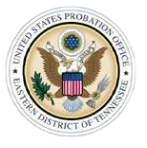Signed into law on April 9, 2008, the Second Chance Act (P.L. 110-199) was designed to improve outcomes for people returning to communities from prisons and jails. This first-of-its-kind legislation authorizes federal grants to government agencies and nonprofit organizations to provide employment assistance, substance abuse treatment, housing, family programming, mentoring, victims support, and other services that can help reduce recidivism. HOWEVER, IT IS LIMITED TO FUND AVAILABLE. More information on the SCA can be found here.
With the passage of the Second Chance Act, officers in the Eastern District of Tennessee now have limited funds and resources not previously available to assist the defendant/offenders who meet eligibility. The Second Chance Act aims to reduce recidivism, rebuild ties between offenders and their families, support evidence-based practices, protect the public, and assist offenders in establishing a self-sustaining life. If you feel you are in need of assistance in the areas below and qualify according to the guidelines, please CONTACT YOUR OFFICER.
Possible services categories available for assistance include:
1. Emergency Services are defined as those defendant/offender needs that are pressing and immediate. These services are designed to ensure the fair administration of justice by meeting the basic humanitarian needs of those under the court’s authority. In addition, addressing these needs may decrease a defendant/offender’s likelihood of recidivism. Emergency services are typically one-time-only situations. Both pretrial and post-conviction supervision cases face crises that may require emergency services. Qualification for emergency services is not dependent upon the defendant’s or offender’s risk level.
Eligibility for authorization to pay for Emergency Services requires:
- A defendant/offender has first exhausted all personal options and resources.
- The emergency situation meets basic humanitarian needs (e.g., food, shelter, medication, or transportation) and is not based upon risk level.
- Officers have exhausted all free community resources available:
Examples of Emergency Services may include:
| Services | Principles | Examples |
| Transportation |
1) Immediate need
2) One time only 3) Not for USPO Office visits or for Mental Health or Substance Abuse Treatment |
Emergency taxi fare, bus ticket for long travel, gasoline, purchase of multiple bus passes |
| Identification |
1) Assist with driver’s license fees (not fines)
2) Assist with cost of personal IDs |
Driver’s License, Occupational license, non-driver identification, e.g., food handler’s license |
| Shelter | Traditional resources can not be accessed. | Offenders ineligible for community resources, e.g., sex offenders, infectious diseases, serious mental disorders |
| Medication/Healthcare |
1) Lack of medication may increase the dangerousness and/or nonappearance or availability of defendant/offender
2) Immediate needs 3) One time only |
Upon release, the offender lacks blood pressure medication |
| Food |
1) May be linked to travel
2) Immediate need *already provided for under §4285. The court can order transportation and subsidies |
The offender has bus fare to cross the country to the district of residence, but no resources for meals |
| Clothing | Not for professional clothing for an interview; must consider other mechanisms e.g., clothing closets, etc. | An offender released on probation in prison jumpsuit; released in the middle of winter with no coat |
| Hygiene | Linked to basic healthcare | |
| Utilities | Defendant relies on an oxygen machine and loses electricity; offender loses power during life-threatening temperatures or conditions | |
| Sex Offender Registration Fees |
1) One time only
2) Must be in accordance with local law enforcement |
2. Transitional Services are intended to mitigate a broad spectrum of longer-term offender needs and deficits beyond that of emergency services that increase the likelihood of recidivism. These services do not include substance abuse dependency and mental health disorders, as they are provided for under the law enforcement budget. Transitional Services, by nature, typically require more significant intervention and greater expense than do emergency services. Justification for authorizing services is derived specifically from the nexus between the identified need(s) and the likelihood of re-offending. The focus of these services is intended for medium to high-risk offenders, but circumstances may dictate the use of the funds for those with lower RPI scores.
Eligibility for authorization to pay for Transitional Services requires:
- A defendant/offender has first exhausted all personal options and resources
- The services to be provided reduce the risk of recidivism by directly addressing longer-term defendant/offender needs and deficits, other than substance abuse and mental health disorders.
- Officers must complete some sort of formal actuarial assessment
- Officers have exhausted all free community resources available.
Examples of Transitional Services may include:
| Services | Principles | Examples |
| Transitional Services |
1) Short term; no more than 90 days
2) Used when traditional methods are delayed e.g. Public Law Placements 3) For offenders rejected by RRC, shelters, etc. 4) Must not run counter to legislation precluding felons from living in federally subsidized housing |
Motels, community centers, and faith-based housing programs |
| Vocational Services |
1) Should enable offenders to secure a sustainable income
2) Soft skills training may be provided by officers, One-Stops, community and faith-based organizations at little to no cost |
Testing and application fees; training manuals and materials; CDL programs; pre-apprenticeships |
| Educational Services | Should enable offenders to gain basic proficiency in reading, writing, and basic mathematics | GED, ESL |
| Cognitive-Behavioral Treatment |
1) May need an actuarial risk assessment to determine the need for programming (RPI score or psychosocial assessment)
2) Broader application than just offenders with substance abuse disorders (offenders may be exhibiting on-going criminal behavior) |
“Manualized” CBT programs such as Thinking for a Change, Moral Recognition Therapy |
| Transportation |
1) Must be reasonable and practical
2) Short term; not open-ended |
Bus passes that enable offenders to access vocational training, GED courses; used in rural areas |
